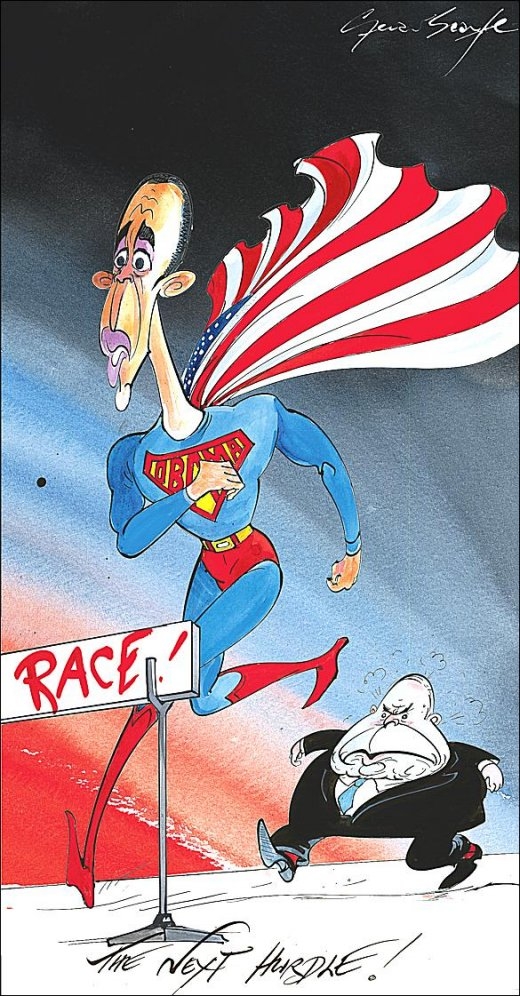 HAROLD JACKSON: To answer your questions: Like most, if not all, editorial boards, we do not divulge our votes. Besides, in most cases, as it was in this one, we reach consensus rather than taking a formal vote. Secondly, like most editorial boards, we do not identify the writers of editorials, because the editorials represent a consensus opinion and not necessarily the opinion of any specific writer. Thirdly, almost every decision the board reaches on any topic is a split decision in that different points of view are expressed before consensus is reached. The Obama endorsement was no different. The decision to run a dissenting point of view was also reached by consensus. Lastly, let me say I am proud that The Inquirer endorsed Barack Obama for president. Readers may remember that I stated Obama as my personal preference in a Sept. 28 column, which I have copied below. Take care.
HAROLD JACKSON: To answer your questions: Like most, if not all, editorial boards, we do not divulge our votes. Besides, in most cases, as it was in this one, we reach consensus rather than taking a formal vote. Secondly, like most editorial boards, we do not identify the writers of editorials, because the editorials represent a consensus opinion and not necessarily the opinion of any specific writer. Thirdly, almost every decision the board reaches on any topic is a split decision in that different points of view are expressed before consensus is reached. The Obama endorsement was no different. The decision to run a dissenting point of view was also reached by consensus. Lastly, let me say I am proud that The Inquirer endorsed Barack Obama for president. Readers may remember that I stated Obama as my personal preference in a Sept. 28 column, which I have copied below. Take care.

BY HAROLD JACKSON There’s no way that I’d vote for Barack Obama just because he and I are both black men. I grew up in Birmingham, Ala., in the 1950s and ’60s. A third-grade classmate went to jail for marching. Another little girl at our school was killed when the Ku Klux Klan bombed Sixteenth Street Baptist Church. I’ve known people who were beaten by Bull Connor’s cops in Birmingham and whipped by state troopers on the Edmund Pettus Bridge in Selma. And I don’t think any of them shed blood for my right to vote just to see me cast my ballots based on skin color.
The 1965 Voting Rights Act was the result of a convincing argument that black people were just as capable of making an intelligent decision about political candidates as any white person. More recently, though, a lie has found favor in America. It’s the falsehood that African Americans vote as a monolith, without regard to the issues or positions of the candidates. It’s a lie promoted by those who don’t want to admit that their preferred candidate was wrong on the issues that matter most to most African American voters.
Black voters’ interests are so common because their circumstances are so similar. Even those with better educations, higher incomes, and more expensive homes are not too far removed from family or friends living modestly. Poverty is itself a recent memory for many middle-income African Americans. Some feel they are only a paycheck or two from returning to that status.
Blacks don’t get credit for carefully weighing candidates’ positions on the issues, even though they have shown that they will vote for a white candidate over a black one whose views are not to their liking. Just ask Lynn Swann. He could have made history as Pennsylvania’s first black governor. But black voters ditched the pro football Hall-of-Famer to reelect Ed Rendell in 2006, because they agreed with Rendell’s thinking on the issues that mattered most to them.
That’s typical. For decades, blacks voted with the party of Abraham Lincoln — until they and the Republicans parted ways on economic and social programs that African American voters supported.
Black voters have consistently been guided by the issues — especially in presidential elections, where before now the final candidates have always been white.
Sure, 2008 is different, with Obama on the ballot as the Democratic nominee. But that Obama is African American makes no difference to me. I’m going to vote for the person who comes closest to me on the issues.
Right now, that’s Obama. He seems to be the better fit for America at this stage in its history. I don’t agree with him on everything. We’re not in the same pew on abortion. But no president will decide that issue. Even those who have tried to stack the Supreme Court to their liking on abortion have barely moved the needle.
But there are many issues where the next president can have an immediate impact. For example, public education, which I strongly support. Public education works very well when the schools are adequately funded, parents make sure their children go to school ready to learn, and competent teachers and principals see their work as a mission — not a job.
I don’t believe John McCain is committed to public education at all. McCain’s education platform mostly consists of suggestions to avoid the public schools: a voucher for this, a voucher for that, and sprinkle a little money on the charters. He repeats the spiel that public schools need competition to improve, but never offers the means they need to compete.
Obama, in contrast, wants to invest in public education. He recognizes that America’s teacher corps must be strengthened, so he wants to create teacher-mentoring programs and reward veteran teachers who become mentors. He wants to expand Early Head Start and Head Start. He wants to give districts funds to lengthen their school day or their academic year. He’s not trying to blow up the public schools, he wants to make them stronger.
On almost any other issue important to me and to many black voters — helping cities fight crime and attract jobs, reducing America’s dependence on fossil fuels, raising taxes on the highest incomes so taxes on the middle class can be reduced – I find myself more in tune with Obama than McCain.
Like Obama, I see the value of setting a flexible schedule to reduce U.S. forces in Iraq. Even President Bush seems to have joined that choir, while McCain clings to his vow to stay in Baghdad until kingdom come, if necessary. I also think Obama will better define our objective in Afghanistan. The Taliban won’t go away if al-Qaeda leader Osama bin Laden is captured.
Obama also made a more credible choice for vice president in Joe Biden. The senator from tiny Delaware doesn’t bring a wad of potential electoral votes with him. He was chosen because of his credentials as one of the Senate’s top minds, especially on foreign policy.
McCain chose Alaska’s pro-life governor, Sarah Palin, to pander to opponents of abortion. They should know by now when a politician is promising goods that he knows he can’t deliver. In choosing a woman, McCain also may have had his sights on disappointed Hillary Rodham Clinton supporters. But I think gun-toting, oil-drilling Sarah is too bitter a pill for them to swallow.
So, I like Obama — on the issues and for choosing a credible second.
I and other black voters will be accused of wanting Obama to fulfill the Rev. Dr. Martin Luther King Jr.’s dream. And that would be nice. But I wouldn’t vote for anyone just for that. Nor do I think King would want that. Because it would be like slavery to be bound to a candidate without regard to his true merit.
E-mail Editorial Page Editor Harold Jackson at hjackson@phillynews.com.
Harold Jackson is the editor of the editorial page. He became deputy editor of The Inquirer’s Editorial Page in 2004, after being cooordinator of the newspaper’s zoned daily commentary and Sunday Voices pages. Jackson has also been an editorial writer at the Baltimore Sun and the Birmingham (Ala.) News. While at the News, he and two colleagues won the Pulitzer Prize for editorial writing in 1991 for a series on changing Alabama’s tax system. He also worked for United Press International and the Birmingham Post-Herald.

